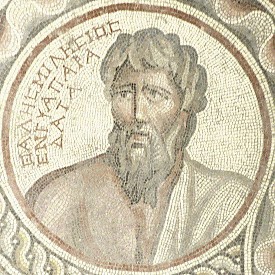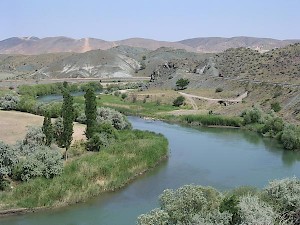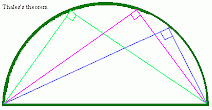Thales of Miletus
Thales of Miletus (first half sixth century BCE): half legendary Greek philosopher and scientist.

We know almost nothing about Thales of Miletus. Later generations told many anecdotes about this man, who was reckoned among the Seven sages, but it is difficult to verify the reliability of these stories. He may have traveled to Egypt, where many Greeks and Carians were welcome as merchants and mercenaries, but on the other hand, it was expected that a wise man made a long voyage to gain knowledge, and this story may have been invented to prove that the sage of Miletus was a wise man indeed. (Similar stories are told about Solon and Pythagoras.)
It is not even certain whether Thales is the author of published texts. The three titles that are attributed to him may be later inventions, or three names of one and the same poem: Nautical astronomy, On the solstice, and On the equinox.
What seems certain, however, is that Thales predicted the solar eclipse of 28 May 585, which was remembered (according to the Greek researcher Herodotus of Halicarnassusnote) because the Lydian king Alyattes and the Median leader Cyaxares were fighting a battle on that day. However, it must be noted that "predicting" merely meant that Thales announced that it was possible that an eclipse could take place during a particular new moon, because by then, not even Babylonian astronomers were able to predict this impressive phenomonen more accurately. Still, even establishing a possibility was a great leap forward for Greek science.

According to a famous story told by Herodotus of Halicarnassus, in c.547 BCE, Thales also changed the course of the river Halys in order to facilitate the crossing of an army of the Lydian king Croesus.note If this story is true, Thales must have died after this year.
Another, perhaps more reliable bit of information is that Thales did geometrical research, which enabled him to measure the seize of the pyramids of Egypt or the distance to a ship at sea. He also proved that a circle is bisected by its diameter, that the angles of the base of an isosceles triangle are equal, and that an inscribed angle in a semicircle is a right angle ("theorem of Thales").

But his most important contribution to western civilization is his attempt to give rational explanations for physical phenomena. Behind the phenomena was not a catalogue of deities, but one single, first principle, which Thales called an archê, "cause". Perhaps influenced by the Babylonian creation stories, he identified this first principle with water, but it is unclear whether he meant that everything being is water or originates in water. (The difference can be explained with boiling water: are the steam and the salty residue different manifestations of one and the same element, or are steam and salt new elements that find their origin in water?)
Still, this does not mean that Thales really broke with religious explanation, and in fact, he would have been surprised to read the preceding section. "All is full of gods", he said. In Magnesia, a town north of Miletus, he observed the typical mineral that derives its name from the town, and argued that because magnets attracted iron, they had a soul. This seems to imply that Thales thought that the soul was the cause of movement. The idea that even minerals could have a soul, resulted in a next step: that everything was animated.
Although Thales' identification of the first principle with water was rather unfortunate, his idea to look for deeper causes was the true beginning of philosophy and science. For this reason, Aristotle of Stagira calls Thales the founder of natural philosophy, a branch of philosophy that also included men like Anaximander and Anaximenes.
Literature
A biography was included in the Lives of Eminent Philosophers by Diogenes Laertius (here).